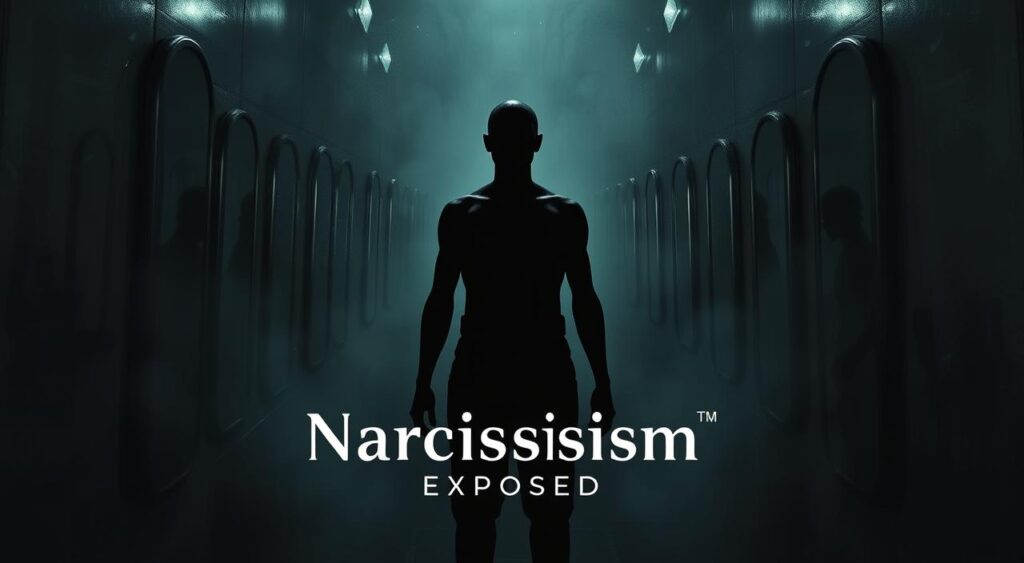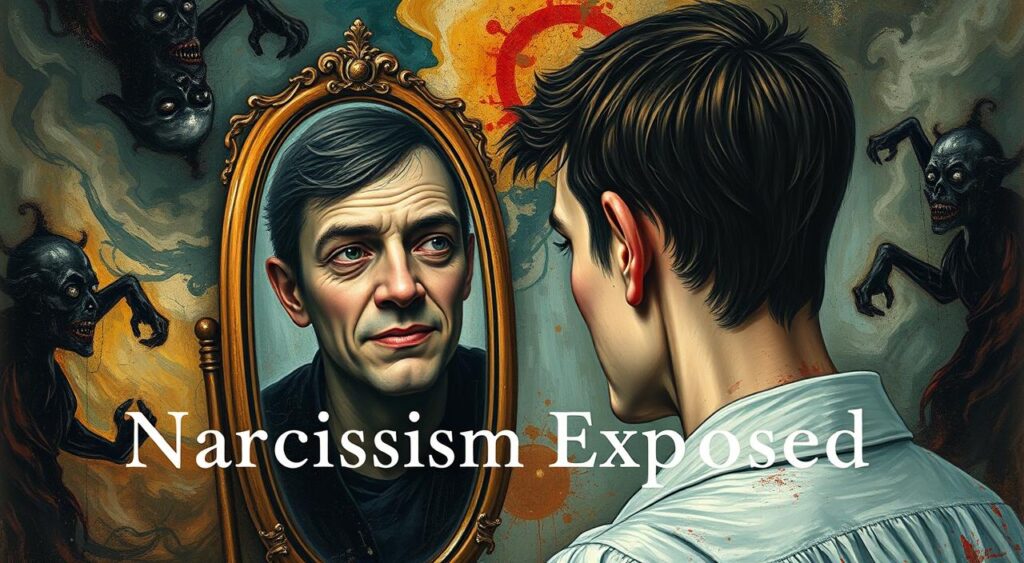Ever felt like something was off in a close friendship but couldn’t quite figure it out? It might be due to the subtle, hidden traits of a covert narcissist. These people hide their true nature behind a mask of humility and trickery. So, how can you spot a covert narcissist friend Let’s explore this complex form of narcissism and find the main signs that could guide you through these tricky relationships.
Key Takeaways
- Covert narcissism can take years to be recognized in someone you know well1.
- Patterns and signs of covert narcissism become evident once identified1.
- Covert narcissists cultivate a public image different from their private behavior1.
- Covert narcissists may withhold, stonewall, or gaslight others1.
- Recognizing covert narcissists is the first step to overcoming emotional and physical trauma1.
Understanding Covert Narcissism
Covert Narcissism: A Subtle Form of Narcissistic Personality Disorder
Covert narcissism is a type of narcissistic personality disorder that shows in subtle, introverted ways. Unlike overt narcissists who crave attention, covert narcissists prefer to stay hidden. They might seem overly sensitive or vulnerable, and they often avoid being in the spotlight2. Yet, both types share a deep sense of self-importance and lack of empathy3.
Known as vulnerable narcissism, covert narcissism is the introverted side of NPD4. These individuals may show their self-importance in less obvious ways. They often struggle with anxiety, depression, and feeling like they don’t fit in4. They might try to get attention by being overly helpful or by doing things for others, hoping to get praise4.
At their core, covert narcissists deeply believe they deserve special treatment and constant admiration. Covert narcissism can be hard to spot because these individuals might seem shy or humble2. But, they react strongly to any criticism or rejection, showing a fragile ego3.
It’s important to understand covert narcissism to deal with its effects on relationships and mental health2. By spotting the subtle signs of covert narcissism, people can protect themselves and their feelings3.
Lack of Empathy and Emotional Detachment
A key trait of covert narcissism is a lack of empathy and emotional detachment. Covert narcissists often ignore how others feel and don’t think about how their actions affect others5. This self-centered behavior makes it hard for friends and family to feel heard and supported, leading to tough times in relationships.
Covert narcissism is a subtle form of narcissism marked by a lack of empathy and emotional6. Signs include being very self-focused, not caring about others’ pain, talking a lot about oneself, ignoring others’ boundaries, not taking blame for hurting others, and being hard to forgive, among other traits5.
Narcissists use covert tactics to manipulate, showing little emotional empathy and trouble understanding others’ feelings5. They might know how others feel intellectually but don’t feel it emotionally. They expect people to focus on their feelings6.
Empathy lets us understand and share others’ feelings. Cognitive empathy is about understanding intellectually, while emotional empathy is feeling with others5. We can improve empathy, which helps in building better relationships6.
“Lack of empathy in a parent or partner can lead to feelings of being unimportant, uncared about, and unloved in the affected individual.”5
Some narcissists have brain patterns showing they’re very sensitive to themselves but not to others5. Covert narcissists might have low self-esteem and be very sensitive to criticism. They’re defensive, don’t admit mistakes, blame others, and criticize a lot6.
People without empathy might take advantage of others and blame the victim5. Narcissists avoid empathy to protect themselves. This comes from not being able to handle emotions well, like feeling shame or rage when expected to be empathetic7.
Not feeling emotions properly in childhood can lead to alexithymia, which links to depression, anxiety, substance use, and health issues5. Being in relationships with those who avoid shame can make it hard to get empathy from them. This can cause relationship problems7.
The official diagnosis of narcissistic personality disorder includes a lack of empathy but notes it’s about not wanting to recognize others’ feelings7. It’s important to know the difference between overt and covert narcissism. Covert narcissists tend to isolate and act passive-aggressive, while overt narcissists are more outgoing and confrontational6.
Shame is a big part of narcissism, leading to grandiosity, entitlement, and a lack of empathy7. Covert narcissists might show traits of Narcissistic Personality Disorder due to childhood trauma, low emotional smarts, or past abuse6.
Studies link narcissism to poor emotional empathy, showing that narcissistic people can understand others’ pain but struggle with feeling it themselves7. Experts believe both overt and covert narcissism come from deep emotional scars, affecting how they handle emotions, talk to others, and figure out who they are6.
Narcissists might manipulate how they see others’ emotions to control or gain power over them. This shows empathy can be used for bad purposes7. Research shows narcissists can be very sensitive to things that upset them but might not even realize it consciously. This makes it hard for them to show empathy in some situations7.
Covert Narcissist Friend: Key Signs to Watch For
Finding out if someone is a covert narcissist friend can be hard. They hide their true nature behind a mask of charm and kindness. Covert narcissists think they are better than others and smarter. They love being the center of attention and use tricks like lying and gaslighting to control people8.
Look out for passive-aggressive behavior. Covert narcissists often make subtle insults or sarcastic remarks that are hard to catch8. They might also make you feel less important or like you don’t understand them.
- Threats to honesty and directness: Covert narcissists get upset or angry when you criticize them, seeing it as a personal attack9.
- Perpetual victimhood: They act like victims, blaming others for their problems and using guilt to control you10.
- Devaluation and idealization: Covert narcissists can suddenly start to belittle or idealize their friends, based on what they need from them9.
Pay attention to how you interact with your friend and notice any patterns that suggest they might be a covert narcissist10. Knowing these signs helps you protect yourself from the negative impact of such a relationship.
“Dealing with a narcissist is an exhausting experience as it involves catering to their needs and being a sponge for their negativity, which can lead to emotional and physical drain.”10
Recognizing a covert narcissist friend and setting clear boundaries is key to keeping yourself safe and maintaining real relationships.
Silent Superiority and Self-Absorption
Unlike the overt narcissist who shows off their self-importance, the covert narcissist keeps a quiet silent superiority and self-absorption11. They watch their surroundings with a critical eye. They listen but don’t really join in conversations11.
Narcissistic Tendencies: Quiet Scrutiny and Poor Listening
This behavior is a sign of their narcissistic traits11. They seem to listen, but they’re really just checking themselves out. Their quiet watching and not really engaging shows they care more about themselves11.
“The covert narcissist often maintains a quiet superiority and self-absorption, observing their surroundings with a critical eye and listening apathetically.”
Hypersensitivity and Difficulty with Criticism
Covert narcissists are very sensitive to criticism or what they see as slights. These individuals often feel everything deeply because they might be Highly Sensitive People (HSPs)12. When given constructive feedback, they might act smug, dismiss it, or pull away to protect their self-esteem13.
Narcissistic personality disorder (NPD) makes people very sensitive to criticism and struggle to take it well13. Covert narcissists get very defensive and might attack when their flaws are mentioned. They find it hard to accept criticism. This makes giving feedback or talking about issues in the relationship tough.
Highly Sensitive People are good at solving problems and understanding others’ feelings. But covert narcissists get aggressive when criticized, showing a big difference1213. This shows how these two groups think and react differently, even if they seem similar.
“Narcissists often struggle to maintain intimate relationships due to their hypersensitivity to criticism and their need to appear perfect.”
Knowing how covert narcissists react to criticism is key to dealing with them. Setting clear boundaries, giving feedback carefully, and getting help when needed can help. These steps can help with their defensive behaviors and difficulty with criticism.
Childhood is a big factor in developing NPD. Kids who were ignored, criticized, or expected too much by their parents might grow up to be narcissistic13. This helps explain why covert narcissists are so sensitive and have trouble with criticism.
Understanding these behaviors and their roots helps us deal with people who have a narcissistic personality and defensive behaviors121314.
Challenges in Maintaining Relationships
Dealing with people who show narcissistic traits can be tough. Covert narcissists find it hard to keep relationships going. They hide their flaws and act superior15.
Narcissistic Relationships: A Lack of Reciprocity and Empathy
Covert narcissists seem calm but don’t let others feel truly heard or supported16. They don’t share feelings or listen well, causing relationships to break down. They focus on their own needs, not on connecting with others.
In narcissistic relationships, the ups and downs can be hard. People feel drained and unhappy16. The narcissist may guilt-trip or manipulate, making it hard to respect and understand each other.
In love, family, or work, covert narcissism brings challenges. They crave praise, envy others, and might even try to undermine others’ success16.
Knowing the issues in narcissistic relationships helps people deal better. It’s about being aware and strong15.
Diagnostic and Treatment Considerations
Covert narcissism is hard to spot in clinics and studies because it’s subtle and not well-studied17. The DSM has trouble defining narcissistic personality disorder, making it tough for doctors to spot and treat covert narcissism18.
Treatment might include therapy or sometimes medicine to help people understand themselves better and feel more empathy17. The DSM-5 gives clear guidelines for diagnosing Narcissistic Personality Disorder, including its subtypes like covert narcissism18.
People with NPD or covert narcissism often show signs like wanting a lot of praise, needing admiration, and not caring about others’ feelings18. This can hurt relationships, work, and mental health, causing more anxiety and less self-esteem18.
To deal with covert narcissists, set boundaries, take care of yourself, get help from professionals, and understand how they affect you and others18. If they also have substance use disorders, it can make things worse, making them feel more alone18.
“Narcissism is a term commonly used in everyday language in the field focused on diagnostic and treatment considerations.”17
Covert narcissism is hard to see because it’s a subtle kind of self-absorption, unlike overt narcissism which is more obvious17. Signs of covert narcissism include acting like a victim, gaslighting, and not caring about others’ feelings17.
Things like childhood trauma or being overly loved can lead to narcissism17. Growing up with a parent like this can make it hard to set boundaries, lower your self-esteem, and make it hard to have healthy relationships17.
Getting help from a trauma therapist is a good idea if you think you’ve dealt with covert narcissism17.
Conclusion
Knowing how to spot a covert narcissist friend is key to staying safe from their tricky and hurtful actions19. These people often show signs like not caring about others, acting superior without saying much, and getting upset easily when criticized20. Spotting these traits helps people set clear limits and keep their relationships healthy20.
Covert narcissists might work in fields like psychology, making it vital to watch out for their subtle signs20. By staying alert and setting strong boundaries, you can dodge their sneaky tricks. This way, you can build real, supportive friendships19.
Being able to see the warning signs and put your own needs first is key when facing a covert narcissist21. With the right understanding and help when needed, you can overcome these issues and find the deep connections you want19.
FAQ
What are the key signs of a covert narcissist friend?
Covert narcissists show little empathy and act superior without saying much. They are very self-focused, get upset easily when criticized, and have trouble with relationships.
How does covert narcissism differ from overt narcissism?
Covert narcissism is a quieter and more hidden form of narcissism. Unlike overt narcissists who show off, covert ones hide their true feelings. They might seem sensitive or vulnerable and prefer to stay out of the spotlight.
What are the key characteristics of a covert narcissist’s lack of empathy?
Covert narcissists don’t really care about others’ feelings or problems. They don’t think about how their actions affect people, making those close to them feel ignored and unsupported.
What are some of the red flags to watch for in a covert narcissist friend?
Look out for signs like being passive-aggressive, acting superior, and threatening honesty. They might also pretend to be perfect or put others on a pedestal. Their public image can be very different from how they act privately.
How does the covert narcissist’s sense of superiority and self-absorption manifest?
Covert narcissists quietly feel superior and focus on themselves. They watch others with a critical eye but don’t really join in conversations. They seem not to care about what others think.
How do covert narcissists respond to criticism or perceived slights?
When criticized or feeling slighted, covert narcissists get very sensitive. They might act smug, ignore you, or pull away. This is their way to protect their fragile ego.
What challenges do covert narcissists face in maintaining relationships?
Covert narcissists find it hard to keep relationships going. They need to hide their flaws and feel superior. This leads to not being very giving or understanding in their relationships.
What are the diagnostic and treatment considerations for covert narcissism?
Diagnosing and treating covert narcissism is tough because its signs are subtle. There’s not much research on it. Therapy and medicine might help them understand themselves better and be more empathetic.
Source Links
- 52 Ways to Identify a Covert Narcissist – https://www.psychologytoday.com/us/blog/the-narcissist-in-your-life/202007/52-ways-to-identify-a-covert-narcissist
- Covert Narcissism: Is My Friend Toxic, Or Am I Just Too Sensitive? – https://medium.com/@amyakianda/covert-narcissism-is-my-friend-toxic-or-am-i-just-too-sensitive-914cb1326aed
- How to Recognize a Covert Narcissist – https://www.verywellmind.com/understanding-the-covert-narcissist-4584587
- 6 Traits of Covert Narcissism – https://health.clevelandclinic.org/covert-narcissism
- Signs of Lack of Empathy and What You Can Do | What Is Codependency? – https://whatiscodependency.com/signs-of-lack-of-empathy-and-what-you-can-do/
- Covert Narcissists: How To Powerfully Cope & Recognize Them – https://www.scienceofpeople.com/covert-narcissist/
- Do Narcissists Actually Lack Empathy? – https://www.psychologytoday.com/us/blog/intense-emotions-and-strong-feelings/202001/do-narcissists-actually-lack-empathy
- 8 Subtle Clues a Person Is a Covert Narcissist – https://leaders.com/articles/personal-growth/covert-narcissist/
- The subtle signs of Covert Narcissism – what to look out for – https://www.drsarahdavies.com/post/covert-narcissism-what-to-look-out-for
- When your best friend is a covert narcissist – https://medium.com/practical-growth/when-your-best-friend-is-a-covert-narcissist-bb9463814578
- How to spot the red flags of a covert narcissist | Camino Recovery Spain – https://www.caminorecovery.com/blog/how-to-spot-the-red-flags-of-a-covert-narcissist/
- Are you a highly sensitive person? Or a covert narcissist? – https://medium.com/@meredith_kav/are-you-a-highly-sensitive-person-or-a-covert-narcissist-c92e25258866
- The Narcissist’s Dilemma: They Can Dish It Out, But… – https://www.psychologytoday.com/us/blog/evolution-the-self/201110/the-narcissists-dilemma-they-can-dish-it-out
- Social Media Use and Vulnerable Narcissism: The Differential Roles of Oversensitivity and Egocentricity – https://www.ncbi.nlm.nih.gov/pmc/articles/PMC8431185/
- This is what you tell people who don’t believe you were abused by a narcissist  – https://sylvialongmire.medium.com/a-guide-to-help-skeptical-friends-and-family-of-narcissistic-abuse-victims-understand-and-believe-9b4d14ac77f5
- The Relationship Impacts Of Dealing With A Covert Narcissist – https://wellbeingscounselling.ca/the-relationship-impacts-of-dealing-with-a-covert-narcissist/
- Understanding Covert Narcissism – https://www.psychologytoday.com/us/blog/making-the-whole-beautiful/202304/understanding-covert-narcissism
- Covert Narcissist: Signs & Symptoms of Covert Narcissism – https://www.theedgetreatment.com/covert-narcissist-how-to-recognize-the-subtle-form-of-narcissistic/
- The End of the Narcissistic Friendship – https://graceformyheart.wordpress.com/2013/06/14/the-end-of-the-narcissistic-friendship/
- What Is a Covert Narcissist? Understanding the Signs and Symptoms | All Points North – https://apn.com/resources/what-is-a-covert-narcissist-understanding-the-signs-and-symptoms/
- The Secret Life of A Covert Narcissist – https://medium.com/@Cafeaulaitgirl/the-secret-life-of-a-covert-narcissist-7d5f58fc7a6c











